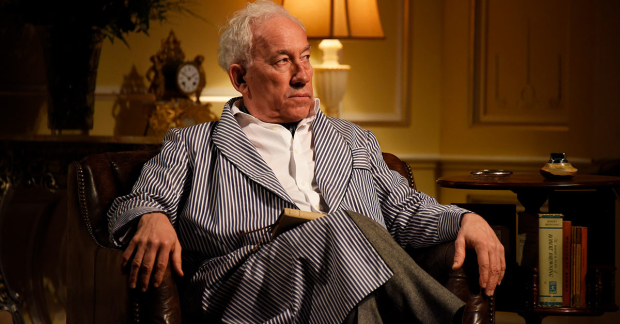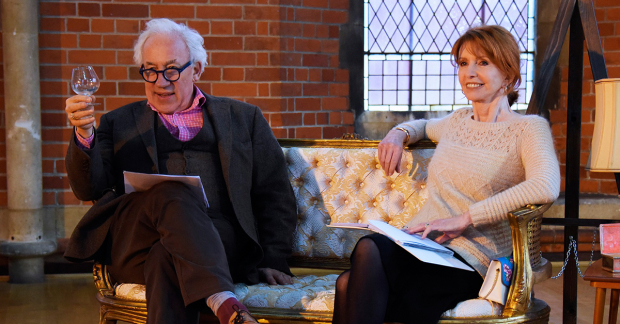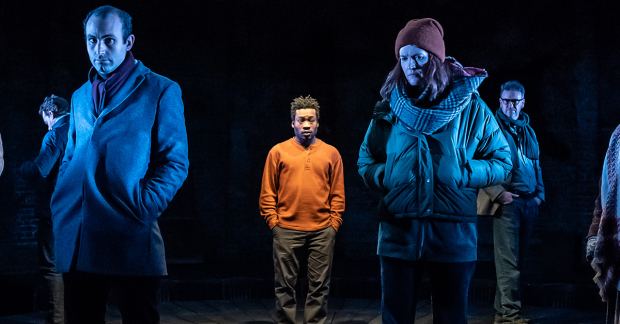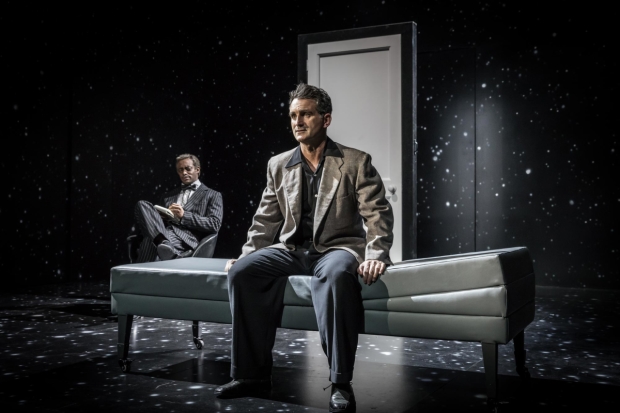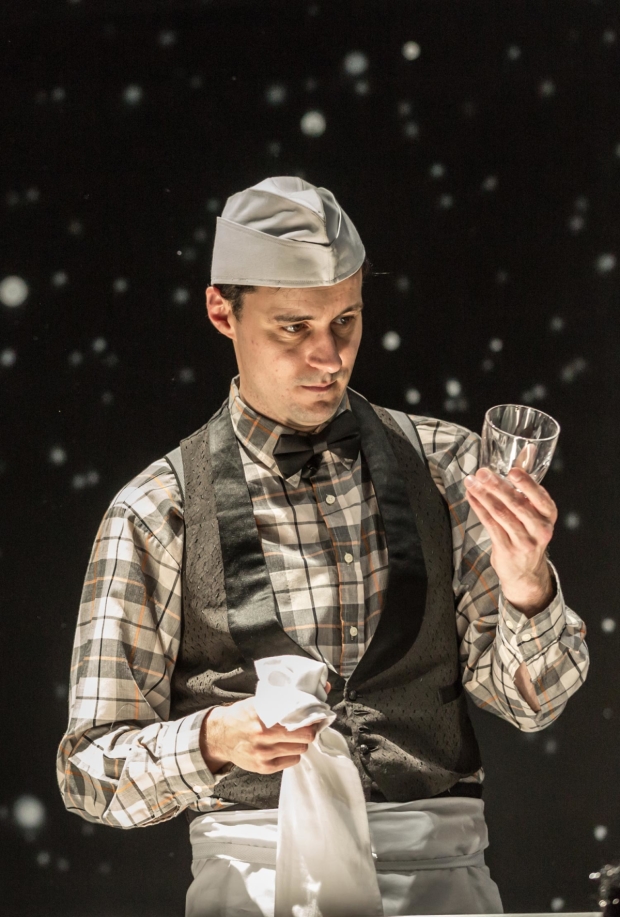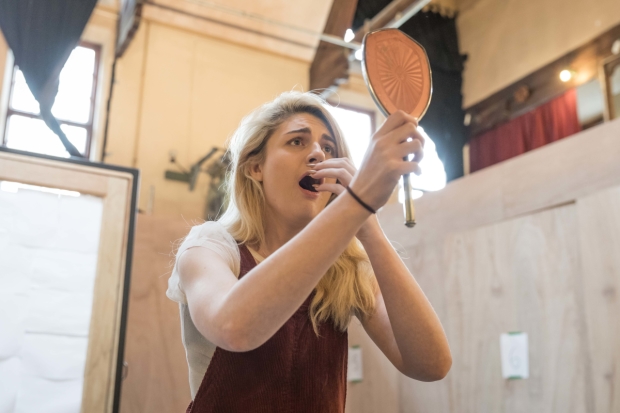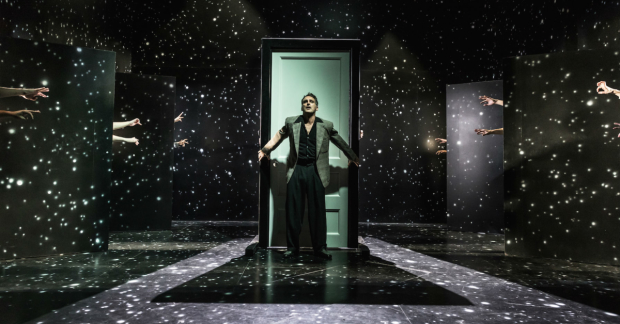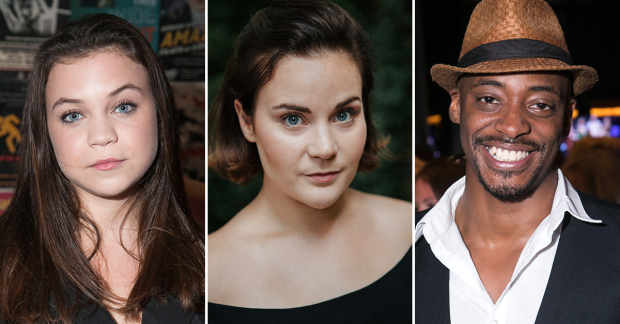Review: The Twilight Zone (Ambassadors Theatre)
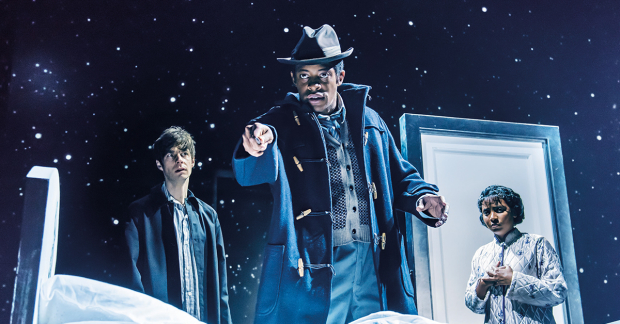
© Matt Crockett
It is hard to imagine a more appropriate playwright to bring Rod Serling's twisty and twisted cult TV series to the stage than Anne Washburn. After envisioning a post-apocalyptic future where The Simpsons has been handed down as a sacred text in her play Mr Burns, and then offering a ritualistic, almost vaudevillian meditation on the impact of Trump's presidency (amongst other things) in the current Shipwreck, she has proved herself to be a hugely imaginative writer unfettered by realism, chronology or conventional structure. Like those plays, this adaptation started out at the Almeida, and I wouldn't be at all surprised to see it settling in for a very long run in the West End.
It helps that the producers have waited for the right theatre to become available: the Ambassadors is possibly the most intimate in town and it is easier here to create an atmosphere of creeping threat than in a larger house – the ingenious surround sound design by Sarah Angliss and Christopher Shutt, and striking lighting by Mimi Jordan Sherin and DM Wood are key elements in this. Richard Jones' monochromatic production brilliantly captures the mix of mayhem, unease and humour that made the original TV programme so compulsive. This combination of unsettling and hilarious is typified by the scene changes (choreographer Aletta Collins' slick, swirling work is just beautiful) which are carried out by masked, boiler-suited stagehands who, when not on the move, blend into the starry night sky walls of Paul Steinberg's simple but stunning set.
Technically, this Twilight Zone is astonishing. There are moments when it knowingly pays homage to the low budget tackiness of 1960s TV production (Neil Haigh's Big Headed Alien is particularly amusing) but the illusions by Richard Wiseman and Will Houstoun are often breathtaking.
One of the chief pleasures of this show is the acting. Jones fields a wonderful team of ten performers, all of whom nail the period with an impressive specificity, know with exactly how much tongue-in-cheek it should be played, and who capture the sheer oddness of Serling's vision while finding enough emotional truth to keep modern audiences engaged. There isn't a weak link but there is especially stellar work from Oliver Alvin-Wilson in a quintet of roles, Lauren O'Neil as a grownup victim of childhood trauma, and Daniel Crossley as both a very familiar narrator and a nervous wreck forcing himself to stay permanently awake lest he succumbs to a series of ever more weird dreams involving a mysterious Cat Woman (Natasha J Barnes, thrilling).
Washburn's puzzle-like text takes eight of the iconic episodes and swirls them together so that characters or bits of business that initially look like a theatrical non sequitur, or minor plot strands that seem to have been abandoned, come back later to be at least partially explained. It's impossible to be bored although it could well prove bewildering to anybody unfamiliar with the TV show, or anyone who thought they were coming to see anything like a well made play.
Engrossing and compellingly weird as it all is, it feels too episodic to fully satisfy, until a section late in the second half where the panicked inhabitants of a multiracial suburban neighbourhood turn viciously on themselves in the face of impending nuclear annihilation. This thought-provoking mini-drama packs a truly powerful punch and foreshadows the tensions being expressed in present day America ("you're a foreign person and I don't mean anything racial by that. It's just a fact"). The cast rise magnificently to the challenge, and it is one of the best acted 15-minute scenes on any West End stage at present.
I don't think fans of the TV series will come away from this moody, classy stage distillation feeling short-changed, while playgoers will revel in the irony that something that is imported from a different entertainment medium just feels so, well, theatrical. A shudder-inducingly good night out.



